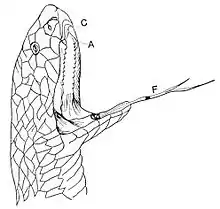gape
English
Etymology
Middle English gapen, from Old Norse gapa (“to gape”) (compare Swedish gapa, Danish gabe), from Proto-Germanic *gapōną (descendants Middle English geapen, Dutch gapen, German gaffen), perhaps from Proto-Indo-European *ǵʰеh₁b-. Cognates include Russian зяпа (zjapa).
Pronunciation
- IPA(key): /ˈɡeɪp/
Audio (UK) (file)
- Rhymes: -eɪp
Verb
gape (third-person singular simple present gapes, present participle gaping, simple past and past participle gaped)
- (intransitive) To open the mouth wide, especially involuntarily, as in a yawn, anger, or surprise.
- 1723, Jonathan Swift, The Journal of a Modern Lady, 1810, Samuel Johnson, The Works of the English Poets, from Chaucer to Cowper, Volume 11, page 467,
- She stretches, gapes, unglues her eyes, / And asks if it be time to rise;
- 1963, Margery Allingham, chapter 9, in The China Governess:
- Eustace gaped at him in amazement. When his urbanity dropped away from him, as now, he had an innocence of expression which was almost infantile. It was as if the world had never touched him at all.
- 1723, Jonathan Swift, The Journal of a Modern Lady, 1810, Samuel Johnson, The Works of the English Poets, from Chaucer to Cowper, Volume 11, page 467,
- (intransitive) To stare in wonder.
- 1682, Thomas Otway, Venice Preserv’d, or, A Plot Discover’d. A Tragedy. […], London: Printed for Jos[eph] Hindmarsh […], OCLC 664400715, Act I, scene i, pages 3–4:
- Home I would go, / But that my Dores are hatefull to my eyes. / Fill'd and damm'd up with gaping Creditors, / Watchful as Fowlers when their Game will spring; [...]
-
- (intransitive) To open wide; to display a gap.
- c. 1591–1592 (date written), William Shakespeare, “The Third Part of Henry the Sixt, […]”, in Mr. William Shakespeares Comedies, Histories, & Tragedies […] (First Folio), London: […] Isaac Iaggard, and Ed[ward] Blount, published 1623, OCLC 606515358, [Act I, scene i]:
- May that ground gape, and swallow me alive, / Where I shall kneel to him who slew my father!
- 1662, Henry More, An Antidote Against Atheism, Book II, A Collection of Several Philosophical Writings of Dr. Henry More, p. 74:
- "Nor is he deterr'd from the belief of the perpetual flying of the Manucodiata, by the gaping of the feathers of her wings, (which seem thereby less fit to sustain her body) but further makes the narration probable by what he has observed in Kites hovering in the Aire, as he saith, for a whole hour together without any flapping of their wings or changing place."
- a. 1699, John Denham, Cato Major, Of Old Age: A Poem, 1710, page 25,
- The hungry grave for her due tribute gapes:
-
- (intransitive, of a cat) To open the passage to the vomeronasal organ, analogous to the flehming in other animals.
- (pornography) To depict a dilated anal or vaginal cavity upon penetrative sexual activity.
Translations
|
|
|
Noun

gape (countable and uncountable, plural gapes)
- (uncommon) An act of gaping; a yawn.
- 1745, Richard Graves, Euphrosyne:
- Now a gen'ral gape goes round,
And vapours cloud each sleepy head.
-
- A large opening.
- (uncountable) A disease in poultry caused by gapeworm in the windpipe, a symptom of which is frequent gaping.
- The width of an opening.
- (zoology) The maximum opening of the mouth (of a bird, fish, etc.) when it is open.
Translations
|
Derived terms
- agape
- gape-mouthed
- gape seed
Anagrams
- PAGE, Page, page, peag
Dutch
Verb
gape
- (archaic) singular present subjunctive of gapen
Anagrams
- page
Northern Sotho
Adverb
gape
- again
Norwegian Bokmål
Etymology
From Old Norse gapa.
Verb
gape (imperative gap, present tense gaper, passive gapes, simple past gapa or gapte, past participle gapa or gapt, present participle gapende)
- to gape (of a mouth, hole, wound etc., be wide open)
- gap opp! - open wide! (e.g. at the dentist)
References
- “gape” in The Bokmål Dictionary.
Norwegian Nynorsk
Alternative forms
- gapa
Etymology
From Old Norse gapa.
Verb
gape (present tense gapar or gaper, past tense gapa or gapte, past participle gapa or gapt, passive infinitive gapast, present participle gapande, imperative gap)
- to gape (of a mouth, hole, wound etc., be wide open)
References
- “gape” in The Nynorsk Dictionary.